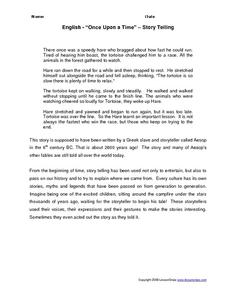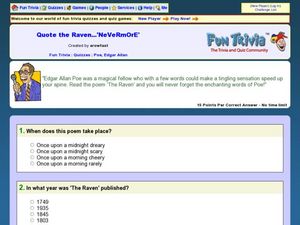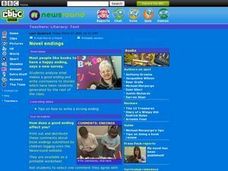Curated OER
English - "Once Upon a Time" - Storytelling
In this storytelling worksheet, 4th graders fill in 17 missing words without looking at the story. After the students read the story again aloud in pairs, the students complete a matrix on how well each student reads the story aloud.
Curated OER
Reciprocal Teaching: The Migrants
Fourth graders use techniques involved in Reciprocal Teaching: predicting, clarifying, questioning, summarizing, and visualizing. They use these reading strategies while reading "The Migrants."
Curated OER
Intermediate Dialogues - "Wait for Me!"
In these dialogues worksheets, students read the dialogue conversation. Students then answer 4 comprehension questions and 4 vocabulary questions.
Curated OER
Reading and Spelling Activity
In this Language Arts worksheet, learners read a short text and answer 8 questions. For example, students choose the correct spelling of the word excited.
Curated OER
Verbs Ending In "S"
In this verb forms worksheet, students read six illustrated verbs that all end in "s". Students write the words and bracket the "s" at the end.
Curated OER
--ace Family Word List
In this --ace word ending worksheet, students read a list of 13 words that end with the --ace pattern. There are no questions to answer; this is a word list.
American Chemical Society
Energy Levels, Electrons, and Ionic Boding
Learners see how electrons are transferred in the bonding of NaCl. They then create models of NaCl using styrofoam balls and toothpicks to assist them in explaining the formation of ions and ionic bonding.
Novelinks
Maus: Bingo Vacabulary Strategy
The definitions for unfamiliar words drawn from Art Spiegelman graphic novel memoir, Maus, provide the clues for a vocabulary bingo game.
Pimsleur
The Weather
What's it like out today, and what do you plan to wear? These are the two main topics for this Italian lesson. By the end of the plan, pupils should have a grasp of basic weather and clothing terms as well as a general understanding of...
Curated OER
Japan Communication
The Japanese communicate in very different ways than people in the US. Using three essential questions as a guide, learners look at different scenarios (included) and compare customs seen here and there. All the materials you need are...
Curated OER
Night: Socratic Questioning Activity
We construct meaning through discussion, so help your readers of Elie Wiesel's work Night with a socratic questioning activity. The strategy is outlined on the first page, and the second page offers some example questions you give to...
Shmoop
ELA.CCSS.ELA-Literacy.RI.11-12.5: Structure of an Argument
Imagine a cross-curricular project that not only rewards learners for examining the textbooks used in their other classes but builds literacy skills as well! Groups compare the formats and writing style in their various textbooks. Teams...
Curated OER
Express Yourself Lesson Seed 17: Obituary
The Cay has been criticized by groups such as the Council on Interracial Books for Children because of the way race is portrayed. Explore the argument against the book while taking the author's perspective into account. Class members...
Urbana School District
Knocking Down Fences
After reading The Other Side and guiding children through a picture walk, third graders investigate evidence of the civil rights movement. In the mini unit, 3rd graders analyze photographs of the past and make connections...
Curated OER
New York State Testing Program English Language Arts Test Book 2-Grade 8 (2010)
Get ready for state testing with this resource, which focuses on listening and writing skills. While a complete description of the writing assignment is provided here, the listening portion is not included. You could use the graphic...
Curated OER
Quote the Raven...'NeVeRmOrE'
What does the raven say and do in the poem by the same name by Edgar Allan Poe? Test your readers' understanding of the raven and the narrator's thoughts and actions with this multiple-choice quiz.
Prestwick House
Touching Spirit Bear: Individual Learning Packet
Whether using Touching Spirit Bear in the classroom, as an outside reading assignment, or in a homeschool situation, your readers will benefit from this eight-page packet of essay and discussion questions, vocabulary lists, and reading...
Curated OER
How Characters Get What They Want
Sixth graders analyze the primary force that drives a character's actions in a character analysis lesson. For this character analysis lesson, 6th graders analyze how characters present their actions and participate in a group activity...
Curated OER
Formal and Informal Language
“C u l8r @ skool.” As part of a study of formal and informal language, class members examine excerpts from Lil’ Boosie lyrics, the Emancipation Proclamation, a speech by Martin Luther King. Links to the resources not provided; however,...
Curated OER
The Spread of Enlightenment Ideas
Looking for a simple and straightforward reference on the Enlightenment for your young historians? Check out this list of key terms and important figures from the period, followed by a traditional assessment where your learners will be...
Curated OER
Novel endings
Students explore writing techniques. They investigate stories and their endings. Students discuss good ending tips. Students write a story about a main character overcoming a problem and write a good ending.
Curated OER
Understanding to Read and Describe It
Second graders, with hearing disability, practice vocabulary building strategies. In this vocabulary strategy lesson plan, a student practices sight words using word cards. The student verbalizes a sentence with the new words while the...
Curated OER
Fun Fonix: Say it. Write in the th, qu, or wh. Read it.
For this phonics worksheet, students demonstrate their knowledge of the concept by responding to 12 fill in the blank questions. Students say the words represented in the pictures, write th, qu, or wh at the beginning or ending of the...
Curated OER
Fun Fonix: O the Words from the Readings
In this phonics activity, students demonstrate their knowledge of the concept by responding to 4 multiple choice questions. Students read a short passage then circle the words from the readings.























